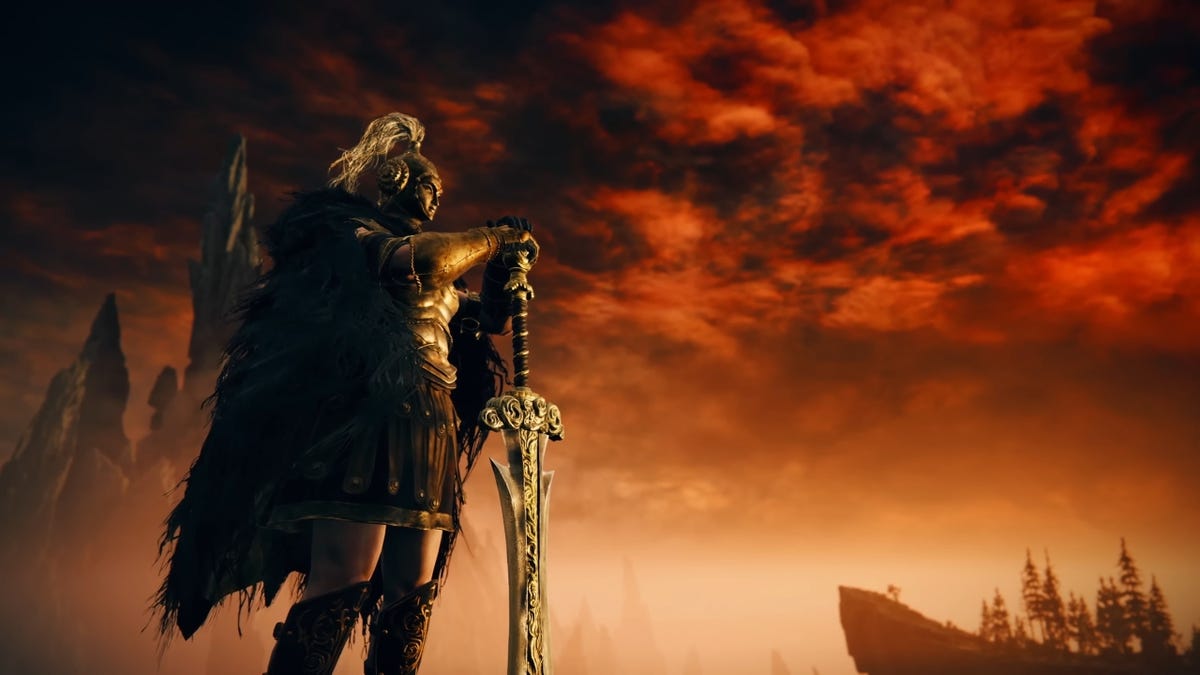Elden Ring has once again found itself at the center of a huge discourse around video game difficulty and I’m already mostly bored of it. Not only do we keep having the same conversation, but it often feels like the wrong conversation, too. However, there’s a wrinkle in this latest round that has piqued my curiosity because it digs into FromSoftware’s philosophy around boss fights, and how every one of them in the Shadow of the Erdtree expansion seems to have infinite combos.
The Most Sought After Elden Ring Sword Has A Storied History
To be clear, this isn’t a bold new claim about FromSoft or Elden Ring. A quick search pulls up plenty of complaints about this approach, like this Reddit post from two years ago bemoaning the length of enemy combos when the game first launched. But it recently kicked back up after the June 21 release of Shadow of the Erdtree, the markedly more difficult expansion that adds a entirely new leveling system as well as a suite of bosses that are driving the community up a wall.
Spoilers for some of Shadow of the Erdtree’s boss fights follow.
For some, Shadow of the Erdtree’s grueling boss encounters have taken too much inspiration from what they consider FromSoft’s worst game design tendencies. Posts keep appearing—either on Reddit or X (formerly Twitter)—about the sheer length of the attack strings that bosses unleash on players, and the relatively short window they get to retaliate. Whether they be the swordmaster Onze, Messmer himself, or Rellana, some folks have had it up to here with FromSoft’s neverending onslaught.
The frustrations have sparked at least a few discussions about how these bosses fit among FromSoft’s oeuvre, and now many are missing simpler times. One post compares Elden Ring’s overly complicated attack patterns to Dark Souls’ more methodical combat and Sekiro: Shadows Die Twice, which they felt at least placed you on even footing with enemies for the most part. By comparison, Elden Ring (and by extension, Shadow of the Erdtree) seems overwhelming. There’s now a whole genre of post poking fun at foes who ceaselessly charge at players in Elden Ring and the difference in FromSoft boss encounters over the years.
Not everyone ascribes to the notion that these fights are any more grueling than usual, or that there’s anything wrong with the long combos. One Redditor doesn’t believe that this is “bad boss design,” arguing that you can like it or not, but that there’s no one way to read the situation. Another post on X (formerly Twitter) in response to the illustration I cited earlier claims that “basically every fight in Elden Ring is designed to trip up players who go in expecting to have an intuitive feel for the pace of combat,” and ultimately found it “as satisfying to learn as [FromSoft’s] other games.”
And of course, there is the tried and true philosophy that most players have internalized in some way or another. That is, that these boss fights are supposed to be hard and challenge you in these exceptional ways so that the triumph over them is that much sweeter.
I myself hate dealing with long combos, and a lot of the shit I’ve seen in Shadow of the Erdtree is the stuff of nightmares. I may have dumped all my skill points into a dexterity build for my Bloodhound Fang, but I myself am not that dexterous and I’m only getting older. I can’t wail away on dodge and jump over certain techniques just to find a split-second window to pop an attack like I used to, and just about every encounter should not feel this way probably!
But I love the superhuman feeling I do get from conquering these things, and by and large, there are systems implemented into these games, whether it’s Scadutree Blessings, damage mitigating armor and talismans, or even simply the act of summoning, that facilitate it. These games are as hard as you make them, you are not their victim!
And then there’s the matter of there being a definite change of philosophy at FromSoft over the years. As FromSoft has iterated on its formula over the years, every subsequent title has significantly differed from the other, and the story here is the same. Dark Souls 2 was alienating to fans of the first game, Bloodborne leaned into a speed and aggression that flew in the face of the whole Souls series, and Sekiro pushed back on most habits that FromSoft games collectively encouraged. Elden Ring is, like the rest of FromSoft’s legendary catalog, a distinct flavor of game, even if it plays within similar conventions and aesthetics. Though it may be tiring to go against such versatile and powerful opponents—which is fair considering the literal gods you’re often up against—expectations that were established by playing previous FromSoft titles should simply not inform or dominate one’s understanding of what Elden Ring has always been and always will be.
